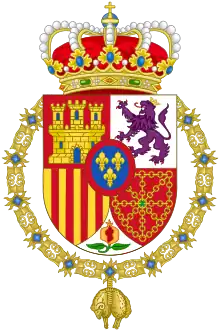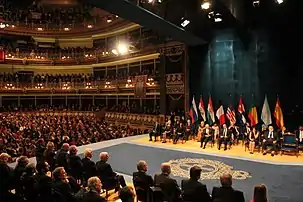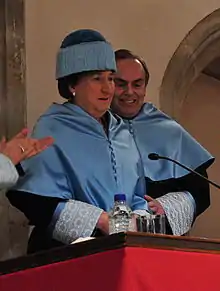Spanish royal family
The Spanish royal family, a branch of the House of Bourbon, is headed by King Felipe VI.
| Spanish royal family |
|---|
 |
|
The King's family
Children of the late Duchess of Badajoz:
The Duchess of Soria and Hernani
|
The current royal family consists of King Felipe VI, Queen Letizia, their children (Leonor, Princess of Asturias and Infanta Sofía of Spain), and Felipe's parents, King Juan Carlos I and Queen Sofía. The royal family lives at the Zarzuela Palace in Madrid, although their official residence is the Royal Palace of Madrid. The membership of the royal family is defined by royal decree and consists of: the King of Spain, the monarch's spouse, the monarch's parents, his children, and the heir to the Spanish throne.[1]
Titles and styles
The titles and styles of the Royal Family are as follows:[2]
- The occupant of the throne is the King (Spanish: el Rey) or the Queen (Spanish: la Reina), together with other titles pertaining to the Crown or belonging to members of the royal family. They are styled His or Her Majesty.
- The King's wife bears the title of Queen (consort) with the style Her Majesty.
- The husband of the Queen regnant, known as "Consort to the Queen of Spain", bears the title of Prince and is styled His Royal Highness.[lower-alpha 1]
- The King's heir apparent or heir presumptive bears the title of Prince or Princess of Asturias with the style Royal Highness.
- A monarch's children besides the Prince or Princess of Asturias, as well as the children of the Prince or Princess, bear the title of Infante or Infanta and use the style Royal Highness. The children of an Infante or Infanta have the rank (but not the title) of Grandees and the style of Excellency.
- Spouses and widows/widowers of the monarch's sons and daughters, other than those of the Prince or Princess of Asturias, are entitled to the form of address and honours the monarch may grant them.
- The sovereign may also grant the dignity of Infante or Infanta with the style of Highness.
Members of the royal family
.jpg.webp)
- King Felipe VI was born on 30 January 1968. He is the third child and only son of King Juan Carlos I and Queen Sofía.[3] He became heir apparent when his father became king in 1975, and was named Prince of Asturias in 1977.[4] He married Letizia Ortiz Rocasolano on 22 May 2004.[5] He became king on 19 June 2014 upon his father's abdication.[6]
- Queen Letizia of Spain was born on 15 September 1972,[7] the eldest daughter of Jesús José Ortiz Álvarez and María de la Paloma Rocasolano Rodríguez.[8] The King and Queen have two daughters.[9][10]
- Leonor, Princess of Asturias is the elder daughter of King Felipe VI and Queen Letizia,[9] and the heir presumptive to the Spanish throne since her father's accession in 2014.[6] She was born on 31 October 2005.[9]
- Infanta Sofía is the younger daughter of King Felipe VI and Queen Letizia. She was born on 29 April 2007.[10]
- King Juan Carlos I is the former king of Spain, reigning from 1975 to 2014. He was born on 5 January 1938 as the eldest son and second child of Infante Juan, Count of Barcelona, and Princess María de las Mercedes, Countess of Barcelona. Through his father, he is a grandson of King Alfonso XIII. On 14 May 1962, Juan Carlos married Princess Sophia of Greece and Denmark, with whom he has three children.[11] Following General Franco's death, Juan Carlos was proclaimed king on 22 November 1975.[12] On 19 June 2014, he abdicated and his son was enthroned as King Felipe VI.[6]
- Queen Sofía is the wife of King Juan Carlos I. She was born on 2 November 1938, and is the eldest child of King Paul and Queen Frederica of Greece. Sofía was the queen consort of Spain during her husband's reign.[13]
Members of the King's family
- Infanta Elena, Duchess of Lugo, born 20 December 1963, is the eldest child of King Juan Carlos I and Queen Sofía.[14] She married Jaime de Marichalar y Sáenz de Tejada on 18 March 1995,[15] and they divorced in December 2009.[16] The Duchess has two children with Marichalar:
- Don Felipe de Marichalar y Borbón (born 17 July 1998)[17]
- Doña Victoria de Marichalar y Borbón (born 9 September 2000)[18]
- Infanta Cristina, born 13 June 1965, is the second child and younger daughter of King Juan Carlos I and Queen Sofía. She married Iñaki Urdangarin Liebaert on 4 October 1997,[19] and they separated in January 2022.[20] Infanta Cristina and Iñaki Urdangarin have four children:
- King Felipe's aunt, the late Infanta Pilar, Duchess of Badajoz, had five children with her husband Luis Gómez-Acebo y Duque de Estrada, 2nd Viscount of La Torre. The children of the Duchess and the Viscount are:
- Doña Simoneta Gómez-Acebo y Borbón (born 31 October 1968)
- Don Juan Gómez-Acebo y Borbón, 3rd The Viscount of La Torre (born 6 December 1969)
- Don Bruno Gómez-Acebo y Borbón (born 15 June 1971)
- Don Luis Gómez-Acebo y Borbón (born 20 May 1973)
- Don Fernando Gómez-Acebo y Borbón (born 13 September 1974)
- Infanta Margarita, Duchess of Soria is the younger sister of King Juan Carlos and the aunt of King Felipe VI. She was born on 6 March 1939 as the third child and younger daughter of Infante Juan, Count of Barcelona, and Princess María de las Mercedes, Countess of Barcelona.[22] She married Carlos Zurita y Delgado on 12 October 1972.[23]
- Carlos Zurita, Duke of Soria was born on 9 October 1943[24] as the son of Carlos Zurita y González-Vidalte and María del Carmen Delgado y Fernández de Santaella.[25] The Duchess and Duke of Soria have two children:
- Don Alfonso Zurita y Borbón (born 9 August 1973)
- Doña María Zurita y Borbón (born 16 September 1975)
House of Bourbon-Two Sicilies
- Princess Anne, the Dowager Duchess of Calabria is the widow of Infante Carlos, Duke of Calabria (16 January 1938 – 5 October 2015), who was the cousin and close friend of King Juan Carlos I.[26] The Duchess of Calabria was born on 4 December 1938, and she is the daughter of Henri, Count of Paris, and Princess Isabelle of Orléans-Braganza.[27] She married the Duke on 11 May 1965.[28]
.jpg.webp) The Dowager Duchess
The Dowager Duchess
Royal family tree
- Notes
* - Member of the Royal Family (as opposed to the Family of the King, or extended family)
** - Member of the Extended royal family
Public role

Members of the Spanish Royal Family are often asked by non-profit charitable, cultural, or religious organizations within and without Spain to become their patrons, a role the Spanish constitution recognizes and codified in Title II Article 62 (j). It is incumbent for the monarch "to exercise the High Patronage of the Royal Academies".[29] Royal patronage conveys a sense of official credibility as the organization is scrutinized for suitability. A royal presence often greatly raises the profile of the organization and attracts media publicity and public interest that the organization may not have otherwise garnered, aiding in the charitable cause or cultural event. Royalty make use of their considerable celebrity to assist the organization to raise funds or to promote government policy.
Additionally, members of the royal family may also pursue their own charitable and cultural interests. Queen Sofía devotes much of her time to the Queen Sofia Foundation (Fundación Reina Sofía);[30] while Leonor, Princess of Asturias presents the annual Princess of Asturias Awards (Premios Princesa de Asturias), which aims to promote "scientific, cultural and humanistic values that form part of mankind's universal heritage."[31] The Princess of Asturias Foundation (Fundación Princesa de Asturias) holds the annual Princess of Asturias Awards acknowledging the contributions of individuals, entities, and/or organizations from around the world who make notable achievements in the sciences, humanities, or public affairs.
King Felipe VI serves as president of the Organization of Ibero-American States which hosts the annual Ibero-American Summit, serves as president of the Codespa Foundation, which finances specific economic and social development activities in Latin American and other countries, and serves as president of the Spanish branch of the Association of European Journalists, which is composed of achieving communications professionals.[32] King Felipe VI also serves as honorary chair of the Ministry of Culture National Awards Ceremonies.[33]
Infanta Elena, Duchess of Lugo, Juan Carlos' elder daughter, is the Director of Cultural and Social Projects of Mapfre Foundation,[34] while Infanta Cristina, Juan Carlos' younger daughter, served as the Goodwill Ambassador to the United Nations for the 2nd World Assembly on Ageing, and is a member of the Dali Foundation Board of Trustees, president of the International Foundation for Disabled Sailing, and Director of Social Welfare at the La Caixa Foundation in Barcelona where she lives with her family.[35]
King Juan Carlos, Queen Sofia, and Infanta Cristina are all members of the Bilderberg Group, an informal think-tank centered on United States and European relations, and other world issues.[36][37][38]
Notes
- Queen Isabella II granted her husband Francis, Duke of Cádiz, the title of King and the style of His Majesty.
References
- Royal Decree 2917/1981, dated 27 November, on the Civil Registry of the Royal Family Boletín Oficial del Estado (BOE)
- Royal Decree 1368/1987, dated 6 November, regulating titles, forms of address and honours pertaining to the Royal Family and to the Regents Boletín Oficial del Estado (BOE)
- "Casa de Su Majestad el Rey de España – Actividades y Agenda – Hitos más importantes de Su Alteza Real el Príncipe de Asturias". Casareal.es (in Spanish). Retrieved 20 June 2014.
- "Don Felipe de Borbón, principe de Asturias". El Pais (in Spanish). 22 January 1977. Retrieved 20 June 2014.
- Wilkinson, Isambard (22 May 2004). "Fiesta spirit returns for royal wedding". telegraph.co.uk. Archived from the original on 2022-01-12. Retrieved 16 May 2016.
- "Felipe takes over as king of Spain". BBC News. 18 June 2014.
- Álvarez, Leticia (19 June 2014). "Letizia Ortiz, Reina de España". El Comercio (in Spanish). Retrieved 29 March 2021.
- "Paloma Rocasolano, enlace sindical" (in Spanish). ES: Diario de Navarra. Archived from the original on 16 February 2007.
- "Spain's future queen gives birth". BBC News. 31 October 2005. Retrieved 15 May 2016.
- "Spanish crown princess has second daughter". Reuters. 29 April 2007. Retrieved 15 May 2016.
- Gay, Danielle (13 May 2019). "Inside Queen Sofía and King Juan Carlos's 1962 wedding". Vogue Australia. Condé Nast. Retrieved 17 September 2020.
- Bernecker, Walther (January 1998). "Monarchy and Democracy: The Political Role of King Juan Carlos in the Spanish Transición". Journal of Contemporary History. 33 (1): 65–84. doi:10.1177/003200949803300104. S2CID 157966975.
- Genealogisches Handbuch des Adels, Fürstliche Häuser XV. "Spanien". C.A. Starke Verlag, 1997, pp. 20, 100-101. (in German) ISBN 978-3-79800-814-4
- "ABC (Madrid) - 21/12/1963, p. 65 - ABC.es Hemeroteca". hemeroteca.abc.es. 8 August 2019. Retrieved 2020-01-12.
- "BOE.es - Documento BOE-A-1995-5742". Archived from the original on 16 January 2008. Retrieved 18 January 2017.
- Villar, Cote. Guardián de acero para el divorcio real. La otra crónica, no. 55 (6 February 2010). El Mundo.
- ESchismógrafo (2018-07-18). "Froilán descoloca a sus propios familiares y amigos con un giro inesperado". esdiario.com. Retrieved 2020-01-12.
- Galaz, Mábel (10 September 2000). "Nace la primera nieta de los Reyes, que se llamará Victoria Federica". El País (in Spanish). Madrid: Prisa. Retrieved 6 May 2019.
- Real Decreto 1502/1997 Boletín Oficial del Estado (BOE)
- Shahid, Sharnaz (24 January 2022). "King Felipe of Spain's sister Infanta Cristina announces separation from Iñaki Urdangarin". Hello!. Retrieved 24 January 2022.
- Luis Gómez (11 February 2014). "How an ideal couple's life went to hell". El Pais. Retrieved 9 September 2016.
- Bianchi, Martin (6 March 2020). "Doña Margarita, la 'super infanta' que caminaba por las cornisas de los castillos, cumple 81 años". ¡Hola!. Retrieved 22 December 2021.
- Salas y Guirior, José (13 October 1972). "La Infanta Doña Margarita ha contraído matrimonio con el doctor Don Carlos Zurita". ABC.
- "Carlos Zurita cumple 78 años, un cumpleaños más marcado por la polémica de Casa Real" (in Spanish). Europa Press. 9 October 2021.
- Obituary of Dr. Carlos Zurita y González-Vidalte, ABC (in Spanish)
- Montjouvent, Philippe de. Le Comte de Paris et sa Descendance. Editions du Chaney, 1998, Charenton, pp. 251-261, 264-265, 270-272. (French). ISBN 2-913211-00-3.
- de Montjouvent, Philippe (1998). Le Comte de Paris et sa Descendance. Editions du Chaney. ISBN 2-913211-00-3.
- Kamm, Henry (13 May 1965). "French Princess Wed To Spaniard". The New York Times. Dreux, France.
- 1978 Spanish Constitution. Part II. The Crown
- Queen Sofia Foundation
- Prince of Asturias Foundation
- Codespa Foundation Archived 2009-05-04 at the Wayback Machine
- Delivery of the National Awards of the Ministry of Culture 2008
- Infanta Elena
- Infanta Cristina
- Mark Oliver (4 June 2004). "The Bilderberg group". The Guardian.
- "Bilderberg Meeting of 1997 Assembles". PR Newswire. 13 June 1997. Archived from the original on 30 April 2011.
- "Bilderberg Group Meets In Athens Amid Tight Security". NASDAQ.

.jpg.webp)
_Presentaci%C3%B3n_de_los_carteles_de_la_feria_taurina_de_San_Isidro_2_(cropped).jpg.webp)
.png.webp)

